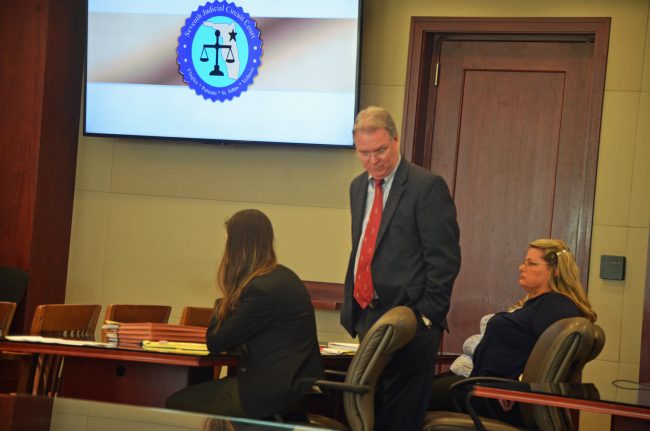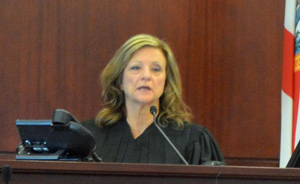
The Kimberle Weeks case has entered its fifth year. But it may not be too comparatively long before the Fifth District Court of Appeal rules on the former Flagler County supervisor of elections’ appeal of a conviction last year on eight felony counts for illegally recording several individuals without their consent. (She was convicted on seven and pleaded guilty to an eighth, the plea made reversible pending the appeal.)
The Weeks case, like her tenure as supervisor, has not lacked for theatrics and complications. The theatrics ended at her sentencing, when she was no longer expected to appear in any court except maybe one more time at oral arguments in her appeal. The complications have carried on, however: they’re inherent to appeals.
In a criminal trial, the prosecution puts on its case before a jury by calling witnesses and having them speak to the evidence in the case. The defense follows. The jury deliberates, then renders a verdict. It can take days, sometimes weeks.
In an appeal, the case is not retried but procedural issues–whether this or that bit of evidence should have been introduced, whether the judge was right to allow or deny testimony–are analyzed and argued. It is neither a second trial nor is the appellate court sitting as a jury, but as judges deciding whether there were legal errors that warrant a new trial or a reversal. The lawyers’ work is done almost entirely through briefs, responses to briefs, responses to the responses, and so on. It can take months, sometimes longer. The lawyers may request oral arguments before judges once all the briefs have been filed, or they may not. Outside of oral arguments there’s no interaction between lawyers and judges.
That’s the stage of Weeks’s appeal of her May 2018 conviction: The lawyers are still dueling with briefs. Circuit Judge Margaret Hudson sentenced the former Flagler County Supervisor of Elections to a month in jail and 18 months of probation. But Hudson suspended the sentence pending the resolution of attorney Kevin Kulik’s appeal.
Kimberle Weeks Appeal Documents
Kulik didn’t file his initial brief until last June. Since then, the state responded at the end of August, and Kulik responded to that response on Monday.
The case was prosecuted in Bunnell by Assistant State Attorney Jason lewis. But the appeal is being handled by Assistant Attorney general; Pamela Koller out of Daytona Beach.
One of the issues Weeks’s defense raised was FDLE investigator Phil Lindley testifying that when he asked her to turn over certain items in compliance with a public record request (the search warrant came later), she had done so in part and declined with regards to other items before she had a chance to speak to an attorney. Kulik objected to Lindley’s testimony because it was “getting close to the idea of infringing on a person’s right to remain silent.” It was, but “getting close” was as far as it got, in the judge’s view, who agreed with the prosecution: when Weeks was asked for items in a public record request she was not under arrest, she was not in custody nor was she being interrogated, so Lindley’s testimony was not prejudicial. The court did find that part of the testimony “non-responsive,” however, and instructed the jury to not consider it.
Kulik considers that an error. He called for a mistrial at the time and was denied. It’s one of the five central points of his appeal. Koller rejects it, calling it “harmless at worst.” In his response Monday Kulik argued that the judge’s ruling enabled the prosecution to build on the error to the point of making the FDLE agent seem more credible than Weeks even in closing arguments, which then affected other aspects of the case to (in Kulik’s argument) Weeks’s disfavor.
Audio: Weeks Insults Detzner
One of those aspects is also part of Kulik’s five grounds for appeal: Lewis played for the jury a recording of Weeks speaking to other, unidentified people and saying all sorts of obscenities about Ken Detzner, the secretary of state (one of the people she’d recorded without his consent). She called him a “dumb piece of shit” and other derivatives of the same idea (along with a statement she made that few would disagree with: “I can’t wait ‘till this shit is over.”) Lewis wanted to show that Weeks had disseminated illegally made recordings for others.
The recording features the voice of a man and that of a woman, but the woman in the background is essentially a laugh track, and the man makes very few remarks only to acknowledge what Weeks is saying as she goes on a five to six minute rant about Detzner and others.
Koller responded by citing precedent placing the threshold for authenticating such recordings quite low, and Kulik’s claim “without merit.”
“There is no definitive list of requirements that must be met to authenticate an audio tape, even though courts ‘occasionally’ suggest these lists,” Koller wrote. “Here, there was sufficient evidence from which the judge could determine that a jury could reasonably conclude that the recording was what the proponent, the State, claimed it was.”
Kulik argues that the recording should never have been introduced because the people in the recording were not “authenticated,” and so was prejudicial to Weeks’s case: Lewis played it or parts of it five times, and made Weeks’s obscenities a central plank of his closing arguments. The jury then asked to hear the tape during its deliberations, prompting Kulik in his response Monday to argue that “error was not harmless where jurors requested to listen to an improperly admitted audio recording during deliberations.”
One of the more curious–and inexplicable–parts of the Weeks trial was the judge’s refusal to allow any definition of the terms “public meeting” for the jury. Yet the heart of Weeks’s strategy was to argue that all her recorded conversations (with one exception) were with public officials in their capacity as officials, in their offices, with all matters discussed pertaining to public, not private issues. At trial, many of those recorded insisted that they were recorded outside the scope of public meetings, and therefore had an expectation of privacy. The terms “public meeting” were bandied about repeatedly. But every time a witness would edge close to explaining what a public meeting is, Hudson, the judge, would shut down that part of the testimony. And she refused to include a definition of the words in the extensive jury instructions she read, and that the jury took into the deliberation room.
Even Lewis made the point, telling Hudson that “[t]his whole case is coming down to what is a public meeting…there has to be some definition of that, judge…I guarantee you if we don’t
define it, Judge, when they go out, they’re going to come back.” In the appeal, however, the state is arguing that no such definition was necessary.
That issue, the final point in Kulik’s appeal, may seem the strongest in the appeal, if only because Hudson never provided a rationale for forbidding a definition beyond saying that she didn’t think it “appropriate for any witness to testify as to what a meaning of a word or phrase in a statute is for purposes of the jury.” In other words, public officials, some of whom–such as Virginia Smith, the Palm Coast city clerk, and of course Detzner and an attorney for the secretary of state–whose responsibilities include a seasoned understanding of Florida’s public record law, were prohibited from explaining it, while a jury made up of individuals with likely little or no understanding of the law were made to rely on that obscurity to render their verdict.

A definition of the terms would not have harmed the state’s case, and clearly the defense would not have objected anymore than the prosecution would have, while a potential error would have been avoided. Instead, Hudson’s decision essentially created a powerful, objectionable point for Weeks where none would have existed before. That means Weeks could possibly win her appeal on a technical judicial error that had no relevance to the substance of the case.





























TheTruth says
The 5th year for this to be going through the County Courts on the books???? I worked in a County Court Assignment Clerks office and our State would not allow a case drag on for 5 years. Seems as though you need to get on with show and get it off the docs.
FlaglerLive says
The case was never in county court. It was tried in circuit court. It is now on appeal before the Fifth Circuit Court of Appeal in Daytona Beach, as noted in the first paragraph.
Ann E Brisson says
I worked under Kimberlee Weeks for 6 years or more, and was proud to do so. I believe she was railroaded by the good old boys in the Republican party since she was a Democrat. They gave her problems at every turn, withholding payment of poll workers pay and finding fault with every decision she made. Her predecessor was never subjected to these restrictions. These people spoke badly of her while the session was being taped, they knew it was being taped, but didn’t realize the taping continued during the break.
tom says
Weeks sure has learned how to bamboozle the judges. Lordie we need a better judiciary.
YAPOS says
Wasn’t the Florida Elections database hacked twice under Detzner and wasn’t it Detzner who was a beer lobbyist before crooked Rick Scott (who made millions from Medicare and again who made more millions while being Florida’s Governor) appointed Detzner to the position of Secretary of State, a position he was not qualified for? With that being said, I would say Weeks sized him up perfectly! Weeks was always upfront and would stand up against the establishment. I agree with Her former employees comment—-this was a witch hunt against her. I hope her appeal vindicated her.
palmcoaster says
I totally agree with Ann Brisson above. I worked under both Supervisors of Elections and Mrs Weeks was a superlative of transparent and honest SOE and just for that she was witch hunted and she got frustrated. We hear the current POTUS with more blasphemy than she used…but seems then okay by the GOP. She fought hard for the voters rights and fair elections and dirty politics at the top want to lynch her wasting our hard earned tax funds on high ticket Herron’s and others hawks legal fees. Hope attorney Kulik and Kimberle win at the end to have justice served as in a public building while doing public business (meaning taxpayers funded) should not be any expectancy of secrecy but instead total transparency.
Carla Rosales says
I noticed Footnote 8 of the Reply Brief quotes a case that says, “The First Amendment protects the right to gather information about what public officials do on public property, and specifically, a right to record matters of public interest.”